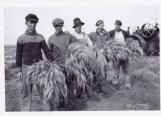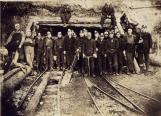1
Myron Kostaniuk tells the story of his immigration and first years in Canada.Recollections from the Life of a Ukrainian Pioneer
I was born in 1891, the year that Pylypiw and Eleniak arrived in Canada to pave the way for the mass Ukrainian immigration that followed to this new land. My parents, Constantine and Petryna Kostaniuk, were poor peasants in the village of Kudrintsi, Western Ukraine, then under the oppressive rule of the Austro-Hungarian monarchy.
Along with many others in the village, as I approached my 18th birthday, I became interested in emigrating to Canada, me reasons behind this decision were obvious. There were six children in our family. My parents had six morgs of land, on which we barely managed to exist. We children constantly heard our parents worrying about how they were going to feed us until we grew up.
Very early in my youth I began to think of myself in the same position. What would I do when I got married and, perhaps, also had six children? How would I feed them? If each of us got only one or two morgs from our parents, we would live in even greater poverty. People were going to Canada - why shouldn't I go, earn a couple of hundred dollars, return and buy a bit more land, and live in plenty? In fact, some people who had gone to Canada were writing back that you could get 160 acres of land for $ 10.00. One hundred and sixty acres? Why, only a rich man could own so much land!
I told my mother of my plan to go to Canada. She said that it sounded good, but it was hard to tell whether it would work out as I had planned. She was right - one doesn't know what the future might hold.
I left Kudrintsi in 1909 with seven others from the village. We traveled through Ternopil, Lviv, Krakow and Venice, and finally arrived at the Yugoslavian port of Trieste. We stayed there for a week. It was the first time that we had our meals with a separate plate for each of us: in the village, the whole family ate out of one dish.
We sailed from Trieste and on July 1, 1909, after 21 days at sea, landed at Ellis Island, New York. After clearing customs, we went on to Montreal, Canada, by train. From Montreal we went on to Fort William in a train crowded with immigrants, and finally landed in the immigration station in Winnipeg.
There was a depression in Canada at the time, and many unemployed. A lot of walking had to be done to get a job. When you did get one, it paid 15.5 or 17.5 cents an hour. You were charged $4.75 for your board and 25 cents a week for medical care. If you earned $50.00 in a month, $25.00 was left after paying these expenses. If you happened to get sick, or if it rained a few days and you didn't work, you earned even less. Before long I realized that earning enough to get those morgs of land at home was but a dream.
FROM ONE JOB TO ANOTHER
Because I was a peasant who had no trade, I was only able to do hard labour for which the pay was very low. If there were no jobs in Winnipeg, like others I got work on railroad extra gangs. We traveled on freight trains from one place to another. I remember working in Wynyard, Saskatchewan, where the boss treated us so roughly that we quit. Another time a few of us walked miles to get to Yorkton where, we were told, jobs were available on extra gangs. However when we arrived, tired and hungry, we were told that we had come too late, and that there were no jobs for us. Catching freight trains to places where we were told jobs were available became part of our life, but we were often chased off the trains.
By 1911, my search for work took me as far as Vancouver, where I worked on the coal docks unloading boats for 45 cents an hour. It was here that I first heard such outstanding socialists as American union leader Bill Haywood and Joe Knight speak at huge public meetings. What I heard them say made sense to me, and influenced me to learn and study why there were so many poor people in our society and why a few rich people controlled the life of the majority of people.
A friend of mine talked me into going with him to work as a harvest hand on a farm in Saskatchewan, where he heard the pay was $2.25 an hour. After looking around for a job for six weeks, we finally got two days of work and received $4.50 in pay. Moving on again, by freight to Kenora, I got a job once more on a railroad extra gang.
Before we had come to Canada, agents had told us that it was a land of great prosperity, that rivers flowed with milk and honey. Being backward, we thought how wonderful it would be not to have to work ourselves, to let others do it. But the years went by with little to show for our hard work, and those morgs of land at home were never bought. Some 48 years went by before I saw my native village again.
The years before World War I were very difficult. There were many unemployed, both Canadian born and immigrants of many nationalities who had come to this country in hopes of improving their lot. After much traveling around and working at various jobs, I settled in Winnipeg. In 1913, I married Katherine Boyko, who had come to Winnipeg in 1912 from the same village, Kudrintsi. Two of our children, Mary and Constantine, were born in Winnipeg; the other two, Peter and Olga, were born in Makwa, in the northern wilds of Ontario, where I later got a job as a section foreman on the Canadian National Railway.
Mary Kardash
"The Ukrainian Canadian" magazine, September 1990, p.35-38, Kobzar Publishing Company Limited

